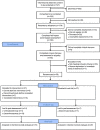Internet-based guided self-help for parents of children on cancer treatment: a randomized controlled trial
- PMID: 25728688
- PMCID: PMC5024013
- DOI: 10.1002/pon.3788
Internet-based guided self-help for parents of children on cancer treatment: a randomized controlled trial
Abstract
Objective: The aim of the study was to investigate the feasibility and preliminary efficacy of an Internet-based guided self-help intervention for posttraumatic stress symptoms (PTSS) and related symptoms in parents of children on cancer treatment.
Methods: Parents of children on cancer treatment, who fulfilled the modified symptom criteria on the PTSD Checklist, were randomly allocated to the intervention or to a wait-list control condition. The intervention group accessed a 10-week guided self-help program via the Internet based on principles from cognitve behavior therapy. The primary outcome PTSS and the secondary outcomes depression and anxiety were assessed by self-report preintervention and postintervention.
Results: Seven hundred forty-seven parents were approached and informed about the study, 92 were assessed for eligibility, and 58 were included and randomized to the intervention (n = 31) or wait list (n = 27). Eightteen participants completed the intervention. Intention-to-treat analyses indicated a significant effect of the intervention on PTSS with a large between-group effect size at postassessment (Cohen's d = 0.88). The intervention group reported reductions in PTSS with a large within-group effect size (d = 1.62) compared with a minimal reduction in the wait-list group (d = 0.09). There was a significant intervention effect on depression and anxiety and reductions in the intervention group with large within-group effect sizes (d = 0.85-1.09).
Conclusions: Findings indicate a low enrollment rate and considerable attrition but also that Internet-based guided self-help shows promise for parents of children on cancer treatment who report a high level of PTSS and would like to take part in an Internet-based intervention.
Keywords: cancer; internet-based intervention; oncology; parents; posttraumatic stress; randomized controlled trial.
© 2015 The Authors. Psycho-Oncology published by John Wiley & Sons, Ltd.
Figures
References
-
- Gustafsson G, Kogner P, Heyman M. Childhood cancer incidence and survival in Sweden 1984‐2010. Report from the Swedish Childhood Cancer Registry. 2013.
-
- Kazak AE, Boeving CA, Alderfer MA, Hwang WT, Reilly A. Posttraumatic stress symptoms during treatment in parents of children with cancer. J Clin Oncol 2005;23:7405–7410. DOI:10.1200/JCO.2005.09.110. - DOI - PubMed
-
- Boman KK, Viksten J, Kogner P, Samuelsson U. Serious illness in childhood: the different threats of cancer and diabetes from a parent perspective. J Pediatr 2004;145:373–379. - PubMed
-
- Fotiadou M, Barlow JH, Powell LA, Langton H. Optimism and psychological well‐being among parents of children with cancer: an exploratory study. Psycho‐Oncology 2008;17:401–409. DOI:10.1002/pon. - DOI - PubMed
-
- Pöder U, Ljungman G, von Essen L. Posttraumatic stress disorder among parents of children on cancer treatment: a longitudinal study. Psycho‐Oncology 2008;17:430–437. DOI:10.1002/pon.1263. - DOI - PubMed
Publication types
MeSH terms
LinkOut - more resources
Full Text Sources
Other Literature Sources
Medical


